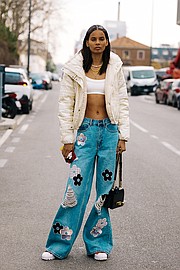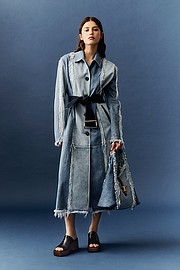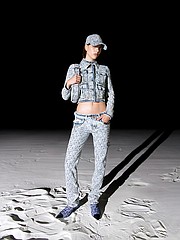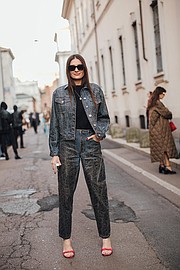Patricia Maeda director of Womenswear at Fashion Snoops and Nia Silva director of materials at Fashion | Thursday, June 30, 2022

For decades, craft denim was a topic for a niche audience of denim connoisseurs: insider knowledge that seemed foreign to the average consumer. Today, heightened awareness of sustainability and growing consumer interest in heritage and tradition are influencing a denim renaissance that honors the process of creation, putting the spotlight on the design journey itself as much as in the end result. Brands are transforming today’s denim offerings by bringing to light the craftsmanship woven into their creation while refreshing the market with progressive denim, reinventing iconic pieces for a new generation.
Honoring the process that goes into a seemingly simple jean is not only culturally informed, it also highlights the skills and techniques developed over time that have transformed the denim industry and contributed to its legacy today. Its weave, dyes, washes and finishes, and even the reuse of old or leftover scraps into new items, are attributes that are now just as important as shape and construction. They represent the true essence of the garment, giving the design an irreplaceable handcrafted touch.

Rooted in tradition
With a rich history dating back to the late 17th century, denim manufacturing was based on the principles of useful skill and mastery of materials, making it an ideal choice for workwear styles. And while their manufacturing has evolved over the years, pioneering factories like Japan’s esteemed Kurabo and Italian family-owned company Candiani continue to maintain their position as industry-leading denim artisans with decades of heritage as validation. They, like many others, espouse the value of premium cotton fibers, slow craft techniques, and meticulous detail above all else. Similarly, well-established denim brands, namely Levi’s, Lee, and Wrangler, share an equally rich and layered heritage where craftsmanship is central to their products.
This penchant for craftsmanship and artisanal heritage is no stranger to ultimate luxury. Fashion houses and high-end designers around the world have found denim to be a perfect canvas for artisanal designs, reframing denim’s humble origins to highlight the expert artistry infused into each garment.
At Tod’s, for example, creative director Walter Chiapponi delivered a Resort ’23 collection rooted in denim craftsmanship, particularly through traditional patchwork techniques where pieces of fabric, carefully sewn together with raw, frayed edges, exuded a textured, almost imperfect surface for items like straight-leg jeans and trench coats. The designer noted that the irregular textures were meant to bring a sense of humanity to the designs, connecting the wearer to the garment as if it too had a story.
Similarly, traditional dyeing techniques have also gained momentum in the denim landscape. At Maison Margiela, creative director John Galliano infused a traditional shibori dyeing technique into statement pieces for his Resort ’22 collection. Evoking a nostalgic thrill of second-hand garments, the pieces seemed to show a patina of age carefully embellished with shibori dye patterns in true indigo tints. Using a technique that emerged to renew old, faded, stained and damaged clothing, Galliano pays homage to what makes craftsmanship so appealing: the skilled hands that, over centuries, have transformed these humble textiles into masterpieces.

Emerging technologies
Over the years, adaptations to new technologies in machinery, fibers, and finishes have helped reshape the modern face of denim craft. No longer limited to classic 3X1 twill constructions or simply stained and untreated surfaces, a plethora of creative and technical offerings are emerging to come up with unique takes on the classics. Whether through elaborate devoré finishing techniques or integrated fiber-tracing technologies, perspectives both old and new have helped solidify denim as a major player that thrives at the intersection of craft and technology.
Continued developments from industry-leading weavers and finishes have spurred a new wave of denim creatives aiming to harness the endless potential of this beloved textile. Among those leading the pack, Diesel has seen a recent resurgence among consumers who align with the brand’s fresh approach to denim as the ultimate design medium for self-expression.
By fusing classic denim archetypes from the Diesel archive with experimental advances in dyeing and finishing, the brand, under the direction of Glenn Martens, has forged something entirely new for the once-humble fabric. Its Resort ’23 collection offerings emerged with hybrid tint features and a distressed super-tactile surface, all deserving of their own moment in the spotlight. Even Diesel’s previous collections, like their FW 22/23 introduction, featured mirror-effect waterproof waxing, eroded super fades, and intensely shredded skin-inspired results like never before seen. Martens has undoubtedly reshaped the brand with his unique vision for the future, pushing the boundaries of traditional denim craft while gaining cult status in fashion communities.

Fueled by the ingenuity, skill and passion of their founders, modern denim industry players continue to hone the potential of denim in a true exercise in creativity. Coupled with sustainability-driven innovation, today’s handcrafted styles not only look good, but are also good for the planet. New voices in the denim space such as Pangaia and Reformation have made conscious efforts to improve production processes, including the use of regenerative Himalayan nettle fibers and new pigments with traceability technologies embedded directly into the fabric of the jeans.
As consumers become more concerned about a sustainable future, they are also learning to develop a greater appreciation for the story behind the products they consume. For denim, it’s often about craftsmanship, technique, and humility – elements that can commonly be overlooked in today’s mass-produced industry, but ultimately connect us to our traditions, immortalizing our heritage for generations. future.
About Fashion Snoops: FS is a global trend forecasting agency helping the world’s leading consumer-facing brands unlock innovation and drive growth. Through a combination of human and artificial intelligence, we analyze cultural changes and interpret detected patterns to unearth trend-driven business opportunities. Learn more at www.fashionsnoops.com.
Source: www.apparelnews.net